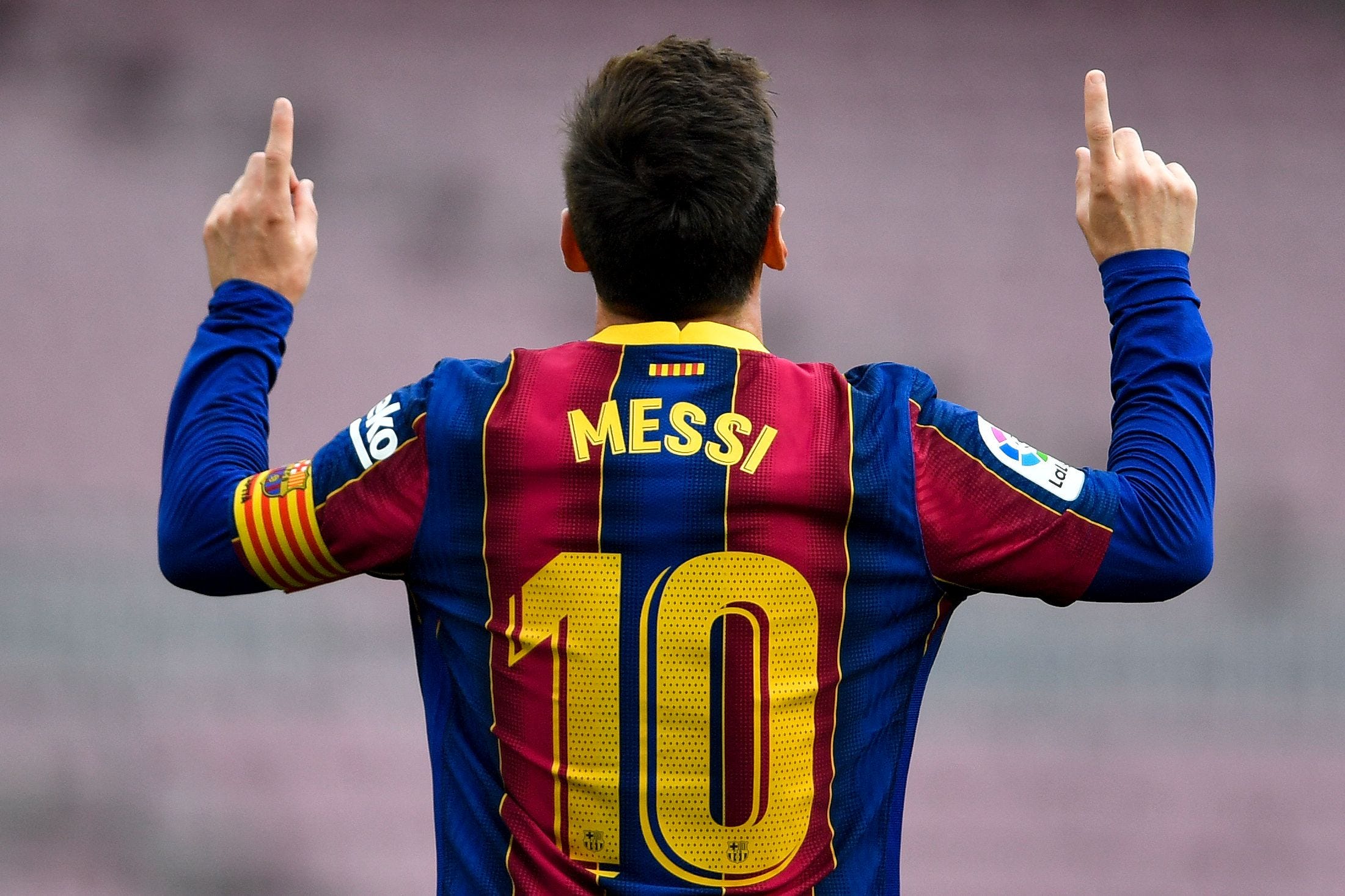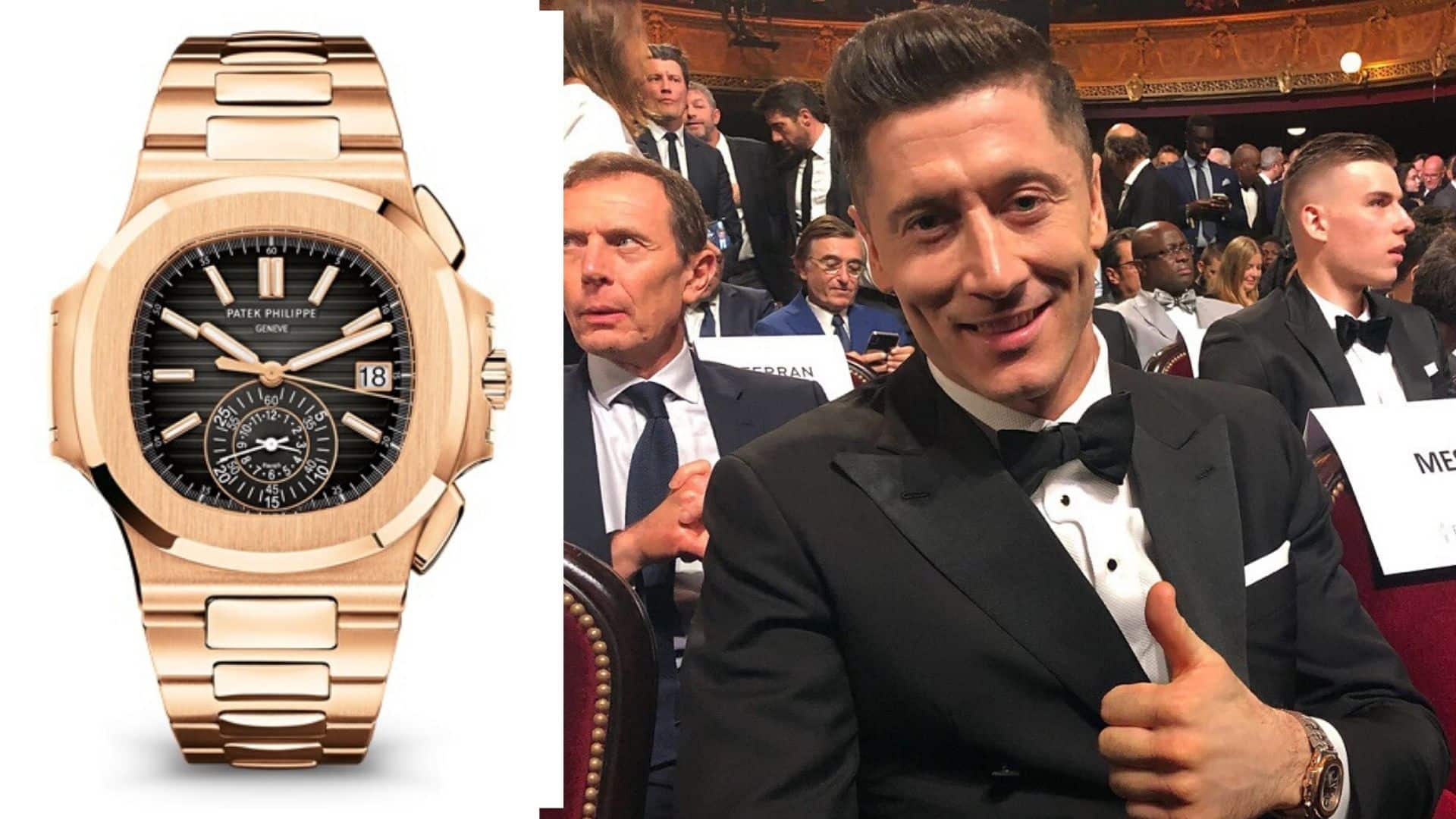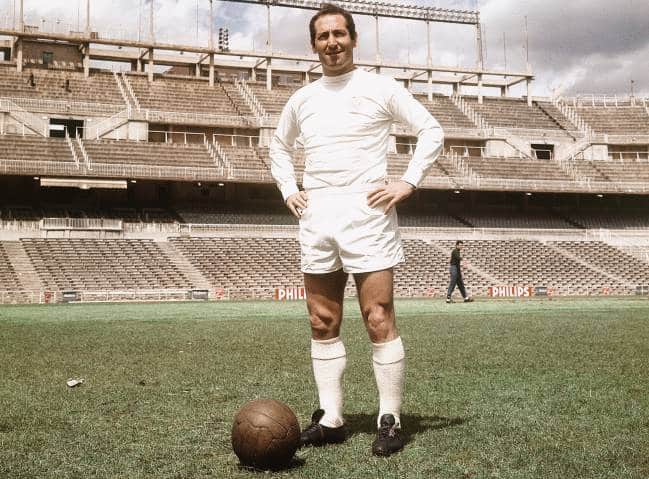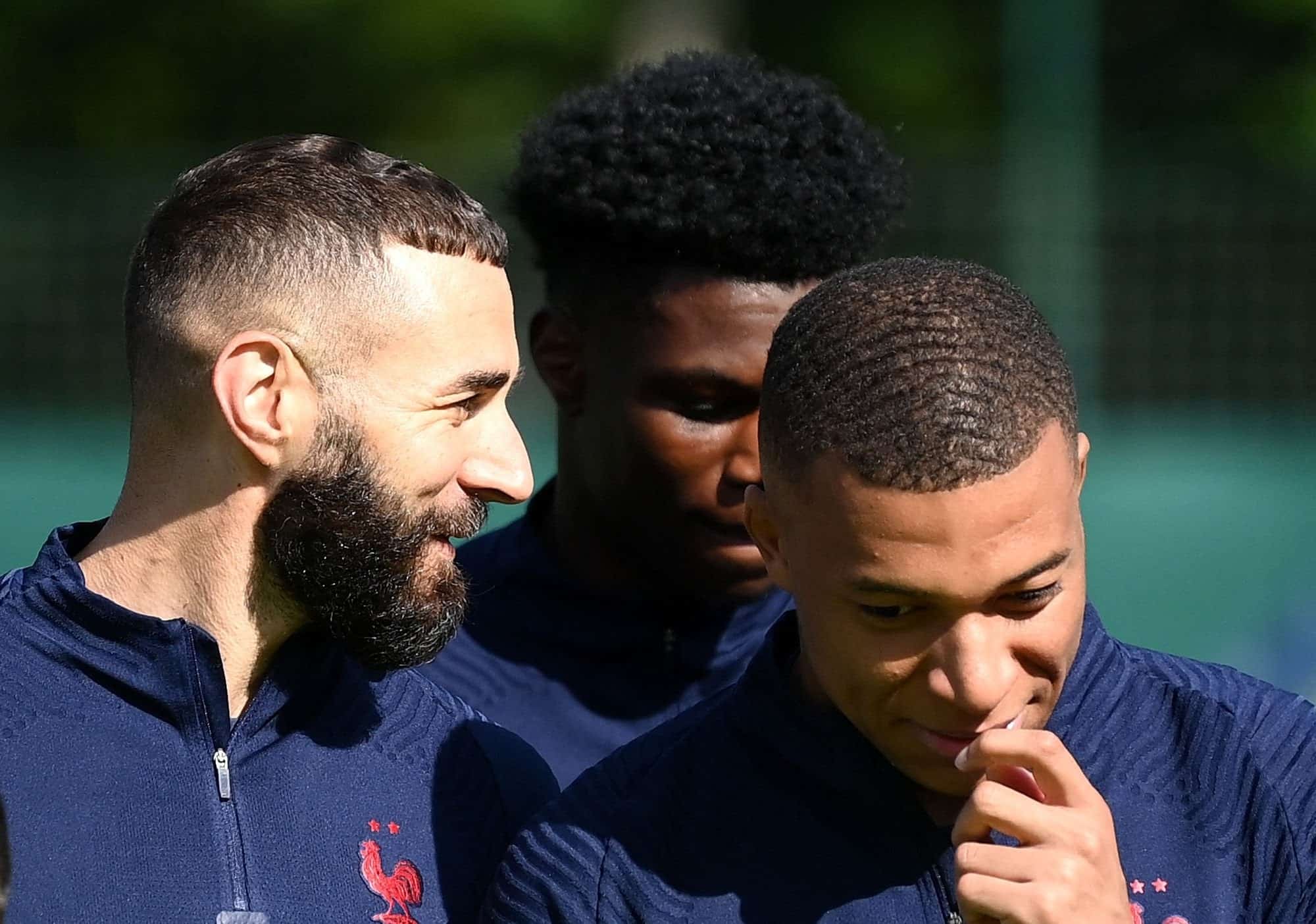Real Madrid Standings 2000-2024: Decades of Dominance and Resilience
This article takes a look into Real Madrid standings across two decades, analyzing their successes, challenges, and the influential players who have kept the team among La Liga’s elite.
Real Madrid was founded in 1902 and joined La Liga in 1929. They have always been at the top, never getting relegated. Their success shows their smart growth and ability to stay ahead.
Real Madrid has won La Liga 36 times and the Champions League 15 times. Knowing where they stand in the league shows their ongoing success. They have had many great seasons, like 2002/2003 under Vicente del Bosque and 2011/2012 under José Mourinho.
Looking at their history, Real Madrid has always brought in top players and played smart. This shows they are a major force in La Liga and Europe. Their long history of success is truly impressive.
Introduction to Real Madrid’s La Liga Journey
Real Madrid started in La Liga in 1929, finishing second in their first year. They are known worldwide for their success and dominance. The club has a long history of winning titles and performing well.
Overview of Real Madrid’s Historical Standings
Real Madrid often tops the La Liga standings. They have been ranked number one in the IFFHS Club World Rankings in 2000, 2002, 2014, and 2017. Their excellence is also seen in their UEFA club rankings, where they often rank first.
- Real Madrid has won a record 36 La Liga titles since 2000.
- The team has also secured 15 UEFA Champions League titles.
- In domestic competition, they have clinched the Supercopa de España 13 times.
- Internationally, Real Madrid is a powerhouse with six UEFA Super Cups and two UEFA Cups.
Key Facts and Milestones
Real Madrid has many milestones in La Liga. They won five La Liga titles in a row in the 1960s and 1980s. In the 2023/24 season, they won first place with 95 points, 10 points ahead of FC Barcelona.
- Madrid won their 36th La Liga championship in the 2023–24 season, surpassing all rivals with four games to spare.
- Carlo Ancelotti celebrated his 11th and 12th trophies as manager during the same season.
- The team secured their 15th UEFA Champions League title by beating Borussia Dortmund in the final match.
- At home, the highest attendance recorded was 77,981 for the El Clásico against Barcelona.
Real Madrid has always been at the top of La Liga. They have shown they can keep performing well over time. Their success shows their lasting legacy and ability to adapt in football.
The Real Madrid “Galácticos” Era (2000-2005): Triumphs, Struggles, and the Beckham Effect
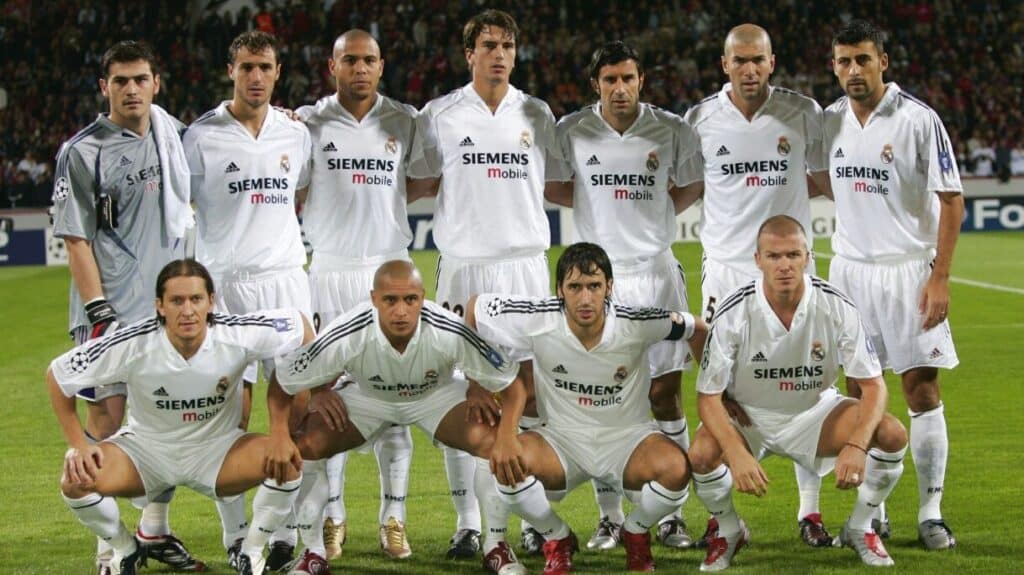
The early 2000s marked a defining chapter in Real Madrid’s history, known as the “Galácticos” era. This period, initiated under club president Florentino Pérez, aimed to bring the world’s most celebrated players together, not only to dominate European soccer but also to position Real Madrid as the most globally recognized soccer brand. Between 2000 and 2005, Real Madrid invested heavily in star players, creating a unique blend of talent and influence that shaped the club’s identity and set new standards for soccer’s global appeal. Yet, while this strategy delivered moments of brilliance, it also revealed some unexpected challenges in team cohesion and performance.
Building the Galácticos: The Stars Join Real Madrid
Florentino Pérez’s ambitious vision led to the recruitment of some of soccer’s biggest names, starting with Luís Figo’s transfer from Barcelona in 2000. His arrival shocked fans worldwide, intensifying the fierce rivalry between the two clubs and signaling Real Madrid’s aggressive approach to acquiring top talent. Figo’s signing was quickly followed by the arrival of Zinedine Zidane in 2001, who joined Real Madrid for a world-record fee. Zidane’s finesse and tactical intelligence became the heartbeat of Madrid’s midfield, and his iconic volley in the 2002 Champions League final brought Madrid their ninth European Cup.
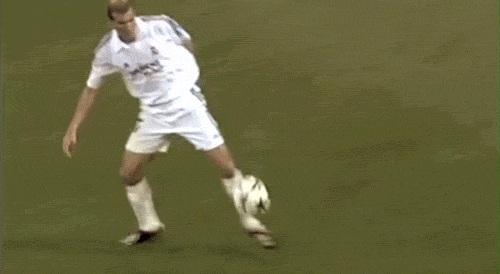
Ronaldo Nazario, the prolific Brazilian forward, joined in 2002, adding firepower to an already potent squad. Ronaldo’s arrival paid immediate dividends, as he scored 23 goals in his first season, helping Real Madrid win the 2002-2003 La Liga title. In this period, Madrid managed to secure two La Liga titles (2000-2001 and 2002-2003) and the 2002 UEFA Champions League. These successes highlighted the squad’s immense individual talent and underscored the power of Pérez’s vision for Real Madrid.
David Beckham’s Arrival: A Blend of Sport and Stardom
David Beckham’s transfer from Manchester United in 2003 was perhaps the most commercially significant signing of the Galácticos era. Beckham, with his reputation as one of the world’s most marketable athletes, brought unparalleled global attention to Real Madrid. Initially, Beckham’s signing was met with mixed reactions; while his marketing appeal was undeniable, skeptics questioned how well he would integrate into Real Madrid’s already star-studded midfield.
Despite these concerns, Beckham became an essential part of the team, bringing precision with his crosses and free kicks. His dedication and work ethic eventually won over fans and teammates. Though Real Madrid struggled for silverware in the early part of Beckham’s tenure, his final season with the club, 2006-2007, was a turning point. Beckham played a critical role in helping Real Madrid secure the La Liga title under Fabio Capello, a victory that emphasized his transformation from a marketing asset to a valued player. His commitment during this period highlighted his professionalism, solidifying his reputation as more than just a celebrity signing.
The Challenges and Downfall of the Galácticos Model
While the Galácticos era brought undeniable glamour and global appeal, the club’s performance on the field began to suffer as the seasons wore on. The heavy focus on high-profile acquisitions sometimes disrupted team cohesion, as managers struggled to balance the squad and integrate star players with contrasting playing styles. The defense, which lacked the same high-profile investments as the attack, began to show vulnerabilities, exposing Real Madrid to challenges from Spanish and European rivals alike.
From 2003 to 2005, the team went through a period of managerial instability, with Vicente del Bosque’s departure followed by several short managerial stints. This instability, coupled with a tactical imbalance, led to underwhelming results in both La Liga and the Champions League. The failure to secure significant silverware after the 2002-03 La Liga win put the Galácticos strategy under scrutiny, as fans and analysts alike questioned whether the focus on marketable stars was overshadowing the team’s need for a balanced, cohesive lineup.
The End of an Era: Legacy and Lasting Impact
By 2005, the Galácticos era was beginning to wind down. While Real Madrid’s early 2000s team is remembered for its unmatched skill and global influence, the club’s inability to achieve consistent success during this period highlighted the challenges of building a team around star power alone. Nevertheless, the era left an indelible mark on Real Madrid and the broader soccer world, reshaping how clubs approached player recruitment and global branding.
David Beckham’s move to LA Galaxy in 2007 marked the end of his time with Real Madrid and signaled the end of the Galácticos era. Beckham’s departure and subsequent influence on soccer in the United States underscored the lasting impact of Real Madrid’s focus on star players. This period taught valuable lessons in balancing talent with strategy, and the club’s future strategies reflected a shift toward a more cohesive team approach under managers like José Mourinho and Zinedine Zidane.
The Galácticos Legacy
The 2000-2005 Galácticos era at Real Madrid remains one of the most memorable chapters in modern soccer history, marked by unprecedented stardom, iconic moments, and challenges that highlighted the complexities of managing top-tier talent. From Figo and Zidane to Ronaldo and Beckham, the Galácticos helped transform Real Madrid into a globally recognized brand and elevated La Liga’s appeal worldwide. While the experiment with star power ultimately revealed the need for tactical balance and team cohesion, the legacy of the Galácticos endures, influencing Real Madrid’s approach to this day and inspiring clubs worldwide to aim for both sporting excellence and global impact.
Seasonal Performance: 2005-2010
From 2005 to 2010, Real Madrid went through ups and downs. They had changes in management and rebuilding phases. Yet, they won big, showing their strength at times.
Players like Iker Casillas and Sergio Ramos were key. They played well, helping the team win both at home and abroad. Their hard work made them essential to Real Madrid’s success.
The 2006/07 season was a turning point. Real Madrid won La Liga under Fabio Capello. The next year, under Bernd Schuster, they won again. These wins showed the team’s strength, even with changes in leadership.
Real Madrid’s success came from great individual and team efforts. Keeping players fit and making smart changes helped them face challenges. They stayed at the top of Spanish football, proving their worth.
The 2005-2010 years laid the groundwork for future wins. Real Madrid’s commitment and ability to adapt were key. These qualities helped them achieve great things during those years.
Here’s a table of Real Madrid’s major achievements from 2000-2005 and 2005-2010 across La Liga, UEFA Champions League, Copa del Rey, and the Intercontinental Cup:
| Period | La Liga Titles | UEFA Champions League | Copa del Rey Titles | Intercontinental Cup |
|---|---|---|---|---|
| 2000-2005 | 2 (2000-01, 2002-03) | 1 (2001-02) | 0 | 2 (1998, 2002) |
| Notable Players | Figo, Zidane, Ronaldo, Beckham | Zidane’s Volley in Final | Raul, Roberto Carlos, Casillas | |
| 2005-2010 | 3 (2006-07, 2007-08, 2009-10) | 0 | 0 | 0 |
| Notable Players | Beckham (left in 2007), Van Nistelrooy, Ramos, Higuaín | Rebuilding Phase | Transition toward the next successful era with Cristiano Ronaldo’s signing in 2009 |
Key Highlights:
- 2000-2005: Real Madrid’s achievements during this period are marked by the Galácticos era, with major international signings and a Champions League title, but a lack of consistent success in domestic cups like the Copa del Rey.
- 2005-2010: Real Madrid began rebuilding, transitioning from the Galácticos era with younger talent and securing multiple La Liga titles, especially under coaches like Fabio Capello (2006-07) and Manuel Pellegrini (2009-10).
This overview highlights Real Madrid’s dominance in La Liga and Europe while adjusting its strategy toward sustainable team-building by the end of the decade.
Seasonal Performance: 2010-2015
The years from 2010 to 2015 were a turning point for Real Madrid. They saw impressive wins, key signings, and fierce rivalries. Real Madrid solidified their top spot in European football during this time. Let’s explore the key moments that shaped Real Madrid’s journey.
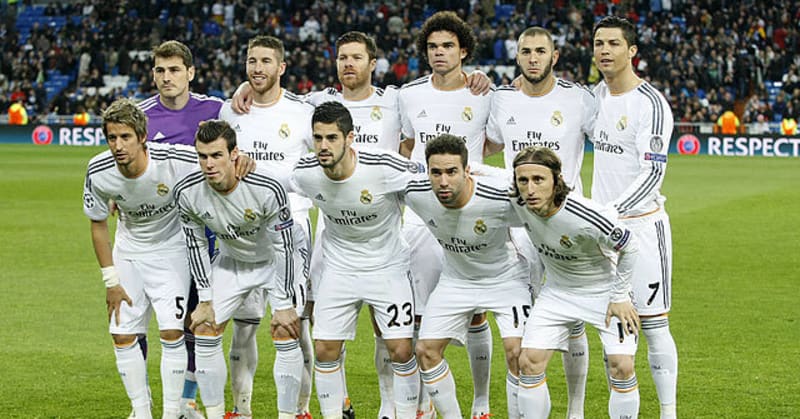
Impact of New Signings
The arrival of Cristiano Ronaldo and Gareth Bale boosted Real Madrid’s attack. Ronaldo, who joined in 2009, scored 40 goals in the 2010-11 La Liga season. This led the league and raised Real Madrid’s ranking.
Bale’s addition later brought more energy to the team. Under José Mourinho, they won the 2011-12 La Liga title with 100 points. This showed their dominance and smart tactics.
Comparison with Rivals
The rivalry with Barcelona was intense during these years. In the 2010-11 season, Real Madrid finished second with 92 points, just four behind Barcelona. They scored 102 goals, the most in La Liga that season.
The period also saw four epic Clásicos in just 18 days. Each match pushed the limits of football excellence. This intensified the Real Madrid table position and on-field conflicts.
Managerial Changes
Real Madrid had several managerial changes that affected their performance. José Mourinho’s tenure from 2010 to 2013 introduced a disciplined, counter-attacking style. This led to the 2011-12 La Liga title and the 2010-11 Copa del Rey.
Under Carlo Ancelotti, who took over in 2013, the team’s style changed. They adopted a more balanced and possession-focused approach. These changes helped Real Madrid improve in domestic and international competitions.
Here’s a summary of Real Madrid’s achievements from 2010 to 2015:
| Season | Achievement |
|---|---|
| 2010-11 | Copa del Rey Winners |
| 2011-12 | La Liga Champions, 100 Points |
| 2013-14 | UEFA Champions League Winners, Copa del Rey Winners |
| 2014-15 | FIFA Club World Cup Winners |
Seasonal Performance: 2015-2020
From 2015 to 2020, Real Madrid had a strong run in both home and international games. Led by Zinedine Zidane, they won two La Liga titles. They also became a top team in European football.
Key Matches and Outcomes
Many key games shaped Real Madrid’s journey. In the 2015-2016 season, they almost won La Liga, finishing second with 90 points. They did win the UEFA Champions League, beating Atlético Madrid 5-3 in penalties after a 1-1 draw.
Their game against Barcelona on November 21, 2015, was a highlight. It drew 80,148 fans. The lowest attendance was 60,663 against Malmö FF on December 8, 2015. Real Madrid’s average home league attendance was 68,929, showing strong fan support.

Zinedine Zidane’s arrival as a manager in January 2016 was a turning point.In the 2016-17 season, Real Madrid soared to first place, capturing their 33rd La Liga title. The team ended with 29 wins, 6 draws, and only 3 losses, showcasing Zidane’s leadership and tactical approach. Ronaldo scored 25 goals, Ramos contributed with timely set-piece goals, and Toni Kroos dominated the midfield alongside Modrić. This season was a golden one for Real Madrid, as they won both La Liga and the UEFA Champions League. Their standing cemented Zidane’s reputation as a top coach, propelling the team to international fame.
Cristiano Ronaldo was the top scorer for Real Madrid. He scored 35 league goals and 51 in total in the 2015-2016 season. His goals helped Real Madrid win another European title.
| Season | La Liga Standing | Points Tally | Top Scorer | Key Achievements |
|---|---|---|---|---|
| 2015-2016 | 2nd | 90 | Cristiano Ronaldo | UEFA Champions League Title |
| 2016-2017 | 1st | 93 | Cristiano Ronaldo | La Liga Title, UEFA Champions League Title |
| 2017-2018 | 3rd | 76 | Cristiano Ronaldo | UEFA Champions League Title |
| 2018-2019 | 3rd | 68 | Karim Benzema | Club World Championship Title |
| 2019-2020 | 1st | 87 | Karim Benzema | La Liga Title |
From 2015 to 2020, Real Madrid faced tough competition and achieved great victories. Their high points tally and UEFA Champions League wins showed their skill and growth.
Following their victorious season, Real Madrid faced challenges in 2017-18, finishing third in La Liga. Zidane’s exit after this season marked a significant change, and the team’s attack, heavily reliant on Ronaldo’s 26 goals, struggled to maintain consistency. Defensive issues also plagued the squad, and despite strong performances from players like Marcelo and Ramos, Madrid’s third-place finish highlighted the need for future adjustments. Real Madrid’s standings that season reflected a time of transition and foreshadowed a period of rebuilding.
The 2018-19 season marked Real Madrid’s first in a decade without Cristiano Ronaldo, who left for Juventus. The impact on their standings was immediate as Madrid finished third once again, with 21 wins, 5 draws, and 12 losses. A carousel of managers—Julen Lopetegui, Santiago Solari, and the return of Zidane—sought to stabilize the squad. Karim Benzema emerged as a leader with 21 goals, but the squad’s inconsistency prevented a successful title challenge. This season underscored the need for a new direction without Ronaldo’s presence.
Seasonal Performance: 2020-2025
Real Madrid has changed its tactics to keep up with the fast-paced world of football. They’ve played many important games, made key decisions, and found new talents. These changes have helped Real Madrid stay strong.
Strategic Shifts and Tactics
Carlo Ancelotti has led Real Madrid to play more possession football. They focus on keeping the ball and moving quickly. Players like Karim Benzema and Vinicius Junior have helped the team grow.
In the 2020-21 season, Real Madrid closely contested Atlético Madrid for the La Liga title, finishing second with 25 wins, 9 draws, and 4 losses. Injuries impacted key players like Ramos, but Benzema’s 23 goals kept Real competitive. Younger talents like Vinícius Júnior and Rodrygo began to make their mark, hinting at Madrid’s future. Despite a strong finish, their standings in second reflected the narrow margin by which Atlético claimed the title.

Under Carlo Ancelotti, Real Madrid returned to first place in the 2021-22 season with 26 wins, 8 draws, and 4 losses. Benzema hit a career high, scoring 27 goals and winning the Pichichi Trophy, while Vinícius Júnior broke out as an attacking threat. Ancelotti’s tactical flexibility allowed Modrić, Kroos, and Casemiro to control the midfield. With David Alaba strengthening the defense, Real Madrid’s standings reinforced their dominance in Spain and Europe as they lifted the Champions League once again.
2022-23: Finishing Strong but Falling Short
Real Madrid’s standings in the 2022-23 season were solid, finishing second to Barcelona. Despite 24 wins, 6 draws, and 8 losses, Madrid struggled to maintain consistency against smaller teams. Benzema remained a key figure, but younger players, including Eduardo Camavinga and Aurélien Tchouaméni, played larger roles, indicating a generational shift in the team. Ancelotti’s approach kept Madrid competitive, although defensive vulnerabilities and injuries were notable challenges.
2023-24: An Impressive Campaign with Rising Stars
Real Madrid’s standings in the 2023-24 season reflected a return to form with 29 wins, 8 draws, and only 1 loss. Benzema’s departure in 2023 allowed emerging stars like Vinícius and Rodrygo to step into the limelight. The team’s additions, including Jude Bellingham, brought renewed energy to the midfield. With a well-balanced squad blending experience and youthful talent, Real Madrid showed resilience and adaptability as they vied for the title.
Upcoming Prospects and Future Outlook
As the 2024-25 season progresses, Real Madrid’s standings have them in a strong position, trailing Barcelona closely. Courtois’s goalkeeping, combined with Alaba’s defensive leadership and Bellingham’s scoring contributions, continues to drive the team forward. While still early in the season, Real Madrid’s focus on balanced, tactical play and the growth of young talents place them as one of La Liga’s top title contenders.
Real Madrid is looking forward to the future with hope. Players like Eduardo Camavinga and Vinicius Junior are making a big impact. They’re helping to keep Real Madrid’s winning streak alive.
Real Madrid is doing well in the 2024-2025 La Liga. They have 7 wins, 3 draws, and 1 loss. This shows they’re ready to keep winning.
Here’s how Real Madrid compares to other top teams in the 2024-2025 season:
| Pos | Team Name | PM | W | D | L | GF | GA | GD | Pts |
|---|---|---|---|---|---|---|---|---|---|
| 1 | Barcelona | 11 | 10 | 0 | 1 | 29 | 8 | +21 | 30 |
| 2 | Real Madrid | 11 | 7 | 3 | 1 | 21 | 11 | +10 | 24 |
| 3 | Atletico Madrid | 11 | 5 | 5 | 1 | 18 | 12 | +6 | 20 |
| 4 | Real Mallorca | 11 | 3 | 4 | 4 | 10 | 8 | +2 | 13 |
| 5 | Valencia | 11 | 3 | 2 | 6 | 9 | 14 | -5 | 11 |
Real Madrid Standings: A Decade of Dominance
Real Madrid has dominated La Liga and Europe for ten years. They’ve won the Champions League six times in eleven years. They’ve also won the Spanish league title in many of those seasons.
Real Madrid’s success comes from smart player choices. Kylian Mbappe and Endrick are recent additions. Mbappe scored 27 goals in Ligue 1 and eight in the Champions League last season.
The team focuses on young talent. They have ten players under 25. Players like Rodrygo and Vinicius Junior are set to lead them to more success.
Real Madrid has won six La Liga titles in a row. They lost only one game to Atletico Madrid. They have the best defense, conceding just 22 goals in 34 games.
The following table shows Real Madrid’s achievements over the last decade:
| Season | La Liga Titles | Champions League Titles | Major Signings | Goals Conceded |
|---|---|---|---|---|
| 2012-13 | – | 1 | Luka Modric | 38 |
| 2013-14 | 1 | 1 | Gareth Bale | 37 |
| 2014-15 | – | – | Toni Kroos | 36 |
| 2015-16 | 1 | 1 | Mateo Kovacic | 34 |
| 2016-17 | – | 1 | Marco Asensio | 30 |
| 2017-18 | – | 1 | Dani Ceballos | 28 |
| 2018-19 | – | – | Vinicius Junior | 27 |
| 2019-20 | 1 | – | Eden Hazard | 25 |
| 2020-21 | – | 1 | Luka Jovic | 24 |
| 2021-22 | 1 | 1 | David Alaba | 23 |
| 2022-23 | – | – | Antonio Rudiger | 22 |
Real Madrid’s success is not just for now. They aim to stay at the top of football. Their consistency and resilience make them a model for excellence worldwide.
Statistics and Analysis of Real Madrid Standings
Real Madrid’s La Liga performance is a mix of strong offense and solid defense. This section looks into key stats, giving a detailed view of their strong play.
Goals Scored vs. Goals Conceded
Real Madrid has shown great skill in scoring goals. They scored first in 73% of their games this season. Their defense is also strong, especially at home, where they never gave up the lead.
At home, they scored first in 67% of games and never trailed. Away, they scored first in 80% of games and equalized in 100% of games when trailing. These numbers show their balanced strategy in attack and defense.
| Match Type | Scored Opening Goal | Led at Half-time | Lead-Defending Rate | Equalizing Rate |
|---|---|---|---|---|
| Overall | 73% | 36% | 70% | 67% |
| Home | 67% | 33% | 100% | 50% |
| Away | 80% | 40% | 40% | 100% |
Points Tally Across Seasons
Real Madrid’s recent success is shown in their steady point gain over the years. Since 2000, they’ve won La Liga eight times. Their points each season show they’re always ahead, in La Liga and the Champions League.
Looking at their points over the seasons, it’s clear their strategy and play have kept them competitive. This analysis shows how their aggressive style and strong defense have made them a top team in football.
Key Players and Their Impact
Real Madrid’s success is thanks to key players. Cristiano Ronaldo and Karim Benzema have been top scorers. They have helped the team win many titles, like the UEFA Champions League and La Liga.
Top Scorers
Karim Benzema was Real Madrid’s top scorer in the 2021-22 season. He scored 27 league goals and 44 in all competitions. His goals helped the team win La Liga and the Supercopa de España.
Kylian Mbappe also showed his scoring skills. He scored seven goals in ten games during his time with the club.
Most Assists
Luka Modric is key in providing assists. His vision and ability to create chances for teammates are crucial. These efforts help Real Madrid stay competitive in La Liga.
Rising Stars
Real Madrid is also counting on young talents. These emerging players promise a bright future. The club is working to develop them, preparing them for big roles.
Real Madrid, one of the most iconic teams in La Liga history, has consistently been at the top of the standings over the past ten seasons, showcasing resilience, tactical evolution, and star-studded rosters.
Key Takeaways from Real Madrid Standings
Over the past ten seasons, Real Madrid’s standings have consistently shown them to be a force in Spanish football. The team has navigated transitions, managerial changes, and the exit of legendary players, including Ronaldo and Benzema, to remain among La Liga’s elite. With strategic acquisitions and a blend of experience and youth, Real Madrid has continually adapted, proving that even as the roster evolves, their status as top contenders remains a constant in La Liga standings.
Notable Real Madrid Players (2000–Present):
| Season | Notable Players |
|---|---|
| 2000–2001 | Iker Casillas, Fernando Hierro, Roberto Carlos, Luís Figo, Raúl González, Claude Makélélé |
| 2001–2002 | Zinedine Zidane, Steve McManaman, Fernando Morientes, Santiago Solari |
| 2002–2003 | Ronaldo Nazário, Guti, Michel Salgado, Iván Helguera |
| 2003–2004 | David Beckham, Rubén González, Francisco Pavón |
| 2004–2005 | Michael Owen, Jonathan Woodgate, Thomas Gravesen |
| 2005–2006 | Robinho, Sergio Ramos, Júlio Baptista |
| 2006–2007 | Ruud van Nistelrooy, Fabio Cannavaro, Mahamadou Diarra |
| 2007–2008 | Arjen Robben, Wesley Sneijder, Gonzalo Higuaín |
| 2008–2009 | Lassana Diarra, Klaas-Jan Huntelaar, Rafael van der Vaart |
| 2009–2010 | Cristiano Ronaldo, Kaká, Karim Benzema, Xabi Alonso |
| 2010–2011 | Mesut Özil, Ángel Di María, Sami Khedira |
| 2011–2012 | Raphaël Varane, José Callejón, Nuri Şahin |
| 2012–2013 | Luka Modrić, Michael Essien, Diego López |
| 2013–2014 | Gareth Bale, Isco, Dani Carvajal |
| 2014–2015 | James Rodríguez, Toni Kroos, Keylor Navas |
| 2015–2016 | Mateo Kovačić, Danilo, Lucas Vázquez |
| 2016–2017 | Marco Asensio, Álvaro Morata, Mariano Díaz |
| 2017–2018 | Theo Hernández, Dani Ceballos, Achraf Hakimi |
| 2018–2019 | Vinícius Júnior, Thibaut Courtois, Brahim Díaz |
| 2019–2020 | Eden Hazard, Ferland Mendy, Rodrygo Goes |
| 2020–2021 | Martin Ødegaard, Éder Militão, Luka Jović |
| 2021–2022 | David Alaba, Eduardo Camavinga, Antonio Rüdiger |
| 2022–2023 | Aurélien Tchouaméni, Antonio Rüdiger, Endrick |
| 2023–2024 | Jude Bellingham, Fran García, Arda Güler |
| 2024–2025 | Kylian Mbappé, Endrick, Fran García |
Note: This table highlights select notable players from each season and is not exhaustive.
